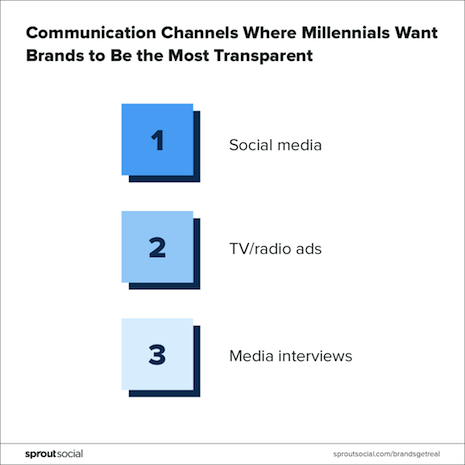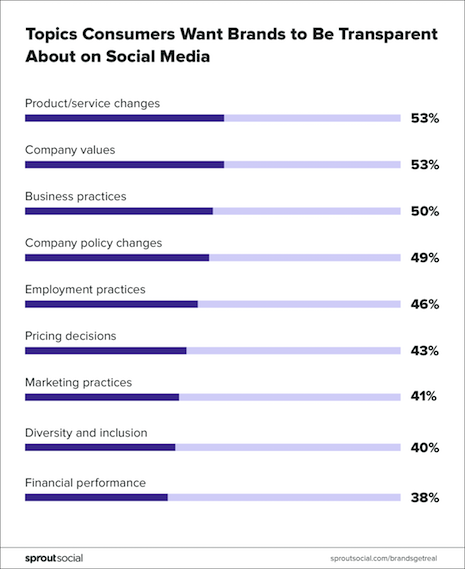Transparency is proving to be more important than brands think when it comes to consumer relationships on social media.
According to a new report from Sprout Social, 86 percent of users say that brands who are not transparent on social media will cause them to turn to a competitor. This is especially important when it comes to a public crisis, with nine out of 10 survey takers saying they would stay loyal to a brand if it was transparent in these moments.
“Our data shows that transparency truly makes the difference in forming lasting connections between businesses and consumers,” said Jamie Gilpin, chief marketing officer at Sprout Social, Chicago. “But being a transparent brand is much more than a singular campaign or announcement.”
Transparency and social
Some brands may fear that the transparency created through social media could be damaging, but the rewards of this can far outweigh its pitfalls, according to Sprout.

Image credit: Sprout
Fifty-three percent of consumers will likely purchase from a brand if it is transparent on social. Also, 85 percent of shoppers would give a brand a second chance even if they have had a bad experience if the company has a history of being transparent on social media.
If a company has bad press and faces an issue, it can be resurrected in the eyes of social users if it owns up to its mistakes and is open and honest on social media. Eighty-nine percent of consumers believe this.
Brands are also held to a higher standard in this aspect, with 81 percent of respondents believing it is brands' responsibility, while this is thought of as less important for politicians, friends or family or survey takers themselves.
There is still a long way to go for brands with transparency online, with only 15 percent saying that they believe brands are transparent. About 30 percent believe brands are not transparent at all and 55 believe they are somewhat transparent.
Millennials are pushing the need for a closer relationship between businesses and consumers forward, as they are interested in hearing the values of both the CEO and the brands themselves.

Image credit: Sprout
This becomes important in not just attracting these young consumers for their business, but for their employment as well.
A CEO’s social media use and his or her transparency impacts more than one in five millennials’ decisions regarding place of work.
Additional insight
Another report finds that a number of luxury fashion labels disclose little to no details about their supply chain, environmental and social policies, leaving room for more transparency in the industry.
Dior, Max Mara and Longchamp are among the brands that received low scores on Fashion Revolution’s Fashion Transparency Index, which analyzes publicly accessible information. As consumers desire more details about the origins of the products they buy, transparency is a key component to winning and keeping their business (see story).
Contrary to some speculation on young people getting burnt out on constant advertising, new research shows that Gen Z is happy to engage with branded content so long as it is entertaining and transparent.
This data comes from Fullscreen, which recently dug into the media consumption habits of young consumers to gauge how brands can reach them with engaging content. What it found was that young consumers will engage with branded content if it touches on their passions and does not seek to mislead or misrepresent (see story).
“It’s an ongoing practice that showcases the humanity of a brand and builds a relationship that’s rooted in authenticity and honesty,” Sprout Social's Ms. Gilpin said. “Social media is a prime platform for brands to build this relationship and establish unwavering consumer trust.”
{"ct":"XaSrEPuap5m7KxpiVLJDCSPMR0FBObsE36Laqayv2upPJ\/d1XSBb1EEuGPVFftjQcWzikMaX\/5TI8\/WX8Dpkxx5vq0Xft\/ZFfzqdOLrNF+eRToPDRZhAOaVp6dS36KeeOtupKcVrnW+8NGoP2CqQxXagn1kvN9\/ZBPK12rbkVI212OMZSayRofOLj15NYYEGyrFXvgykYjFgz\/yQVIK7tveAetzdwWyJWjuDl\/BAVsJ+3Gk+cUr\/m\/l3yMljx1l88QnNMH35\/0MPVFoYQGzN5ganUVRk3BwDPv9WIxdgny8Gb8yKG84Cbg+iSYndNQ9U1wcH\/rSp5sOUcwJSGA\/nM1EY1jHNRyhcP48q70YmMSEEOewfMd+0DBvRLppFdArOUf4r2kOMtoysObgdyFWoBHYSLPlgejhnTnSnEzxEUUsqYIc46o9Mt5WbSvut1BhzU6zQH\/0JYS4tV3uRwGvpQ9NsTRlBK1iWHF5Nz7z8yfyI7usWx75sLRHRF4HHP0XFeMKvHcfySl4LqAk9R38DcLk0MG2CCo6iTLgxKjgC5+71pLNRT8yUi8v0BoD5WFA2NkH+tkIG+3TGySL+SeUV2R72wIKEHPaxI28icuc6DrjflL7eEnuE9nbS18K4cbi1bMjmYn+\/qAGXSJCXX7R3aHm5M9GYKnDOW9FV\/oTgMEQsJ7hGjCRpBXQdE+hixpUboZhosFstiFNB1TkhcUYcYw1Mtrpdkmmgnei3vDSb+7sta3H\/XBLch+igjMaL678pbC+2evlUepgBfVSQSVi9H8axNbEPnHGHhkjyY+oLVp7oTyO913U8qGCIBTG6pvaSiPjNHYAt0ck\/0udyZ4q7NoJfiyFIYlXRCrmp7EeJatxaumGG6dPpXf+LuBu7VHo\/7YMUFSOePUYyKTJmcu48sNFb0ETcqoFSOh6d2b6qng3V3GSGPWFvrwgAO9QjR\/FsLou9gGg2IIFYxxfARfIqKOR\/9CYG7IYN5UtSDY07IYB95JCYNxtokgcSs61bZScCNilT\/cOWkdMqauOKamu7WTw0wwl5g9ESBWFYsFoU0JxBcHAB3h\/G1ApTb2p3xiXmtMEq3aZkP4KQzld+BRZxAWlv7h32p6zJ5MTUG3LFtDezZMKO1k7Gh0JxsQBJvKsk2dOqj1MihGjscwYCXPhYnbCPOZTOWlw65GrUVf171SqDsideGE043b+m7m2Op7D6dmLNUVM7GHNGebckgTMwlsTIZy\/WbRozbV8ijcXLCP4xvBtyTksB2t2hjFUlRUOxHI\/LRl88Siy1Wts0rfzaCNdPYcizu8mLmzrnjooXVRKvvnsiTwD2p7\/j1ItFy0OXjCCXi3x1vUqhGCug\/KcE3sSIqqg+53aI+JJ0KBBeyJ5ZyCyrYlNqEFMyh8+MwIEcGzy7YgvGXqn1hEczB4lpkHIbhCbq+nGQxnkeUw5+xyiM\/3uq\/s5djKslTurv14BpGq\/HOHV+bOiP7Fuo4Zxs+z0GwgYlJ0rkV6h+HKuWudHYarim+EXlXVU93B5GhdGoqNnkEWodq4EUD2ZmIHa+C4kKyiBNDfc5ym9VBsQJMvwDKYDLSsWNjh\/4dUoK7dmTLn1a5jFBBi7vYZB9x8uaMbqzVyi5iA3vB9yDrB67HHvRiJXOVTrg5z35NLIObFLiY\/zCd1ktNMBI++Gp3V2Scg2ZsB2E19uAmbS6gt3xul0CQaozOMkLSbkFBt42svOuEwRn5ScquaFEfM3JyUWfQ28kPG5uWcyweDSWbfQMeco1L4\/maniWP7pWFaQ5kPv22FRD+p7vMM5HYSqTtmRF5u5EhIslhhXXNWr93p+C1eyzjMT4JQSFh10inrzipxfoRi9bvnB7ef+vIVcbmAeBGwbyD5jXtl2pgXWBZu8hfQmKN\/gdcdDW2zos74KiAUGcLKwGgE5pTTMx2\/vtb1Dn+P5DsbWKlC6SKFbd6z1F0n8vLKfC\/WY2apRaO+U4LTTf1Df5eS698REp7jSwbVEmbMMFRUXxjaT893xZRKd2\/RAb6CLkKv9VuJngfGjpleMlgC2A+1NXGXzS6yZ+MI3ciZfn\/2Dv+IPh\/WKeV3azMEIL67I9FY2ScZ2UtKOnmdmtqToVv4hpifRNdZD5b6DxsnlXUn6qeYox4Uo4m0EGAKfxzNkrVTltJSO7Vd5D1ZwSNa6M5x6wjY1YutqYNYczbI+Uy7\/lpfcCTQX06I+B7pN2XJ3RXJWUe901MwsSIvzA5AYDS1hVx7USjyEN2a\/6z5wE6hhqeQqf5474QDsPE\/OuG3\/2c+HoIKVrUbcQN7AH3ECIXBu\/UjTCm7Jpg3Va1imdF33r\/rQDvcvDat\/eT5jSDQwIwoZPn38cd6qqcF+0BLXNYHrgceX2VixbmUvFeGWdG7ylUMYPTueMjI50BvtgQrdW\/Frzg9AzZBqwKgIdxMosntBbvHp4l7+37bwvFuSIhCa5G+tTcp3Gjxwjb4vu2boIL69RPxytoMNVE7uxNe1JOIYExHXJLi9jIu5Ugpfm4InpiAbJUSMY1ReEdixYM9Y1y0PuerB7\/aWxpquDBLNPveP6rcr5u9LYozwXK30SwcheDgPyoqyH7ex3XPkzGQWXeinDT4S0X4QgPOWgqSxVQkj3qi5\/E\/qMMUrx+KCAaXKeOxab2LxLkmFv1we6pQrwYTBPMIDff\/rfI3FK\/Uqp27DpOGWQBgjkVn9Q5HZ0YYH6uQZotoch\/VUvIyjzM8dK9wyk5Kwgoy6SBBN7DKFCvMKJDWV5zNXUNiCrqoH4h94w6H2doGA7\/twkzX9erEkZlmxIDhiCOvO8Jv1xd\/F7DmTNMsHdu6nt053mJqTVRtXpgf+XtPiOdw5HPkzaq4iFsZX0qbwVdel8FiNfCiS8bv3\/mbqtsb+TQATWAjsUlKA1DfQI2cTeeshTdJAuIzKGKRGb+CIiVz5YDS0xozY94Q7sAazpjSxjpdvnC8dCAsNNGJ16iAZfnO+N4hnq3bi4Zt6SVNjWjUqgLugSm+afPVQtbKuFN\/0a08wydvb8u5HHGisu\/c94zseCWHQkMMKXGA7WLkFL9oOzFwH2d5MD0KhC9PzfcFGe5coL8Rw3QpyPgJNRZhVl4BfEyzyzFGfZ2uNZ2Lo24Ee9JlUUvecWZk\/62u6IbsEPLGGw+92OR5vtTJS5mdsUJUQE1GECTSK2nlV6dqlpq2OxZvdIHJQMCmPGhcPLQ\/qenSVQxvBXjtfJnwP2AdQwOlD\/+Xf\/KZopENnmBgsfC01xhb6Q67PgeEjt35fjSQcWYaikVhLvIHN9OAQT3WYS2SEdbqs225+qpQSyy9HMCRJo+YlAD30Sco12VwsjrbyZS22y7bvGNP3feZZ9kRj8KB\/KFxnCPKOkuWyitY+ZwWoo8BCJ\/JsmSZ9gCngl2lwIZ1FtvcVYVZzd6xY3x5n96PHLFyiLkTn5MQmLCb166aC\/X2u4wPimthqkZokS1HChCtEmBWLaZGqDIO9CGUr61Kw4H9H+\/TbLBvfqBzFuImcU6c8QA6StCsnEe3f\/bkzw35LeeFEdLqLnSil\/xqmvh6arrSuq0yo+oNvVjnhfh2KoMLC7LzwxZbuiSEgZUFru1YrruKJrzKlAYHrCoGH18Xz7hkjdjTk5AZhv47mxIKsle9ixODb3eL29jQP3jlTq84dg\/w7xi287O7g3V8h99rc39Pk9HUIKrQWmE6FShUUwkw3doPRVjD9Uh+8F7i30ceNqO2MSDKJLhtJVKs3HVjMLgsujynPHT5CHBo4lf4DU3BMtbc492rk9gRoYZ\/ZLJiSHzmbZsnvHEBvqwZMb2J1HWAovRM1hzMYvZoZksVAUvSmChEg4lI5J6Xd0kXNRVF0d1V8Q+KYw9q0QGWZZYCLb0COGtdqCjb9mRF5AQ1KjqXEjMXx4ZTStH5qJgpl0J82i4GSr6uK+GJP8Az6HbSjg8FnfFPfyLsj7fD57s8xrTsn7cR\/8B\/H76CErSPH3M8kjl9ViSc51zEJOU\/uso\/YHYkCfc42wGB0Tz8m3zEf0AnrPozZXwix7f8q8lWNTP6d\/3ikfoz++Ab6yFZ8k\/n2muR1mG8WGG84fsn6XzrCjYX28qx7x1oCU2NLAZDkkwAKNTka2gFwPD3iuDJm9v8ELmiw\/sv7Fif4ubr\/AOBmbdRjVFMvuFl2ekR2OCi3haiieKS6x6EpMG0BitEBjFptJ4wSsR+uQBfiDucQf47n2B3Bd9zfheCSaWp9RCAR0jSMQXI5hc5X4Z3NIf3JKrdL1JwsUVImTXawkN\/xOTO7EA8a7o5B3wmw1ETSbAwjiw8kMnjU1XSEswYU4z1we9vXhfR1\/BezZ6IEW0PilhsWEhvay2zwcW6ECb2ejnWDl0AF+Fe0JVaj1zSG904pe\/dFHtc75EcCLsd5Sdr9JzJ6FYBBYX9aND8Hq3gSvQKYSU2t9x6Q8VLu4i9ENg+mpw8+045R2UW4bF7bafJEl\/v\/gb9k3i8NIGynr7Si67ZwEV15XCCRZPEZJWKTpQl5MtRjdg1ifWXJJofzVCB2+y6txX1+0zkFxYkf4BTn+fwuUGqRZJhAsc9i8lgefp3VmBwhP2E5AdZfxsl+19xquUvvvuno\/ny\/h6Cd\/CVWDKhyTigzwgf3tj8RP92YW7yO7Bt4J7jn6SfNK1iCXa8hkGRo+Crh7b2uSBfLdvOGoKVFK9eZi3CWqo9BU89Nkubu5p20XZmo9xyT9Bu2f91UrGwh\/7TclZ3xCVRcAX9U8bW9TQ\/egGnc1fGLYYz6tgGDjTH73bdDYgilYaCA3WHzAn5UDfhuc2cboan6zfmcoF0UltLlLseHsy7gF8CAfPPjmpLOwzarOrQm6LJQXU8fvhIpJyhmcVZQqeqr8XpBxcEgiqk757AJOby9yRfGBMRlaaY03DMh2hRiHSE+cnbaqV8IyWe3xSSjqeBOvEw7+cvj8puvasu7YzB7oY2J5Vnk2FeeZ10rhIVnLD1YZk2gi8SuW+3hIl+i1MSLAN0FOWQcTF74sf9XglykOgR9qKg\/HiQOMrzWQbpe4Mirn+2mrOQKU1WxqOTBJlvia+PPr3yPA8G3nYaWgqYhRSQ46DulU3SsL3wNOPpSo5xzyOKV7uUlhs\/+zDtbAdhmFLbjvRtJ\/Q8oIadATiPlasp9gAGHMFQT7hj7GcSTty0P+xKtyIH1PDG+KUg1yXZqosmnba6pRuKMlSONAhK1aEWncKeXZcRAPWt7zNy1Ctr7zonBy+ft8rIlllmft+f\/HrL55rJMXLDifEYikYOeIoFskHNt7lKnAKuTsrvzbj2g930NkK6Wnk8Jd3G1QKNQKJ+SpuV5nNn9LSH65mD9QGDRHvzXRR1ghi0jE7J2viVHzak6r6RNt8QErxG6JsKXNCOX1l\/YO8kZVcdEy35OMVa7Xv+Ko50dehSJvUR5cyEWMJ6MMuWDiBc2iz8\/E5Hs655qoWpTsHeU+ktX7InAIvsBGE\/kMiLvXbZhJ0nnMNzW6GZNRy5VmUZt\/ocP5f9ucrKpEyxHtwr0jtWZyb4rdZ\/AqHM7AFZ\/eU7kbNnvwVDVA\/oI+25EYU40mSFMb9JkPOk2PbWLo9XvmfXP3EbCgHH0H3NtA26ji2qKuxQLhEc5Ztk3DRYsB8Ub3O01BJxsG0NpdkdWnmjuzOnabqTMurfjvCJqqzW+lM54+HP\/muvq6MCs4GEYCLoIu1h4FMaBTnBpCpA4Ex0q7YiwCdtBi8AUSRF0jRUQGHjLyYZlTFtVBsGXnvGvtJJ3trEXiMNBCJ6zhhAXnhyO5ldZzQk8Bo281THcPN0h\/yUj\/+mMrTUp53Q1MCwrLTdDHQWKey7g4yqg0hG0n3p47cuBmmfxW9M95aeA98bw3NILKzbYPdsKYPgZT+exzFd6V9ISqXaDrTv3Z08ONJcq7\/g4OMgnPxSybPqXQWQ5QYBfTfpi+gnzMGZhGErn0vHu\/AicezglyS0fGysvVAoCTzyvKKlgQ5be2c+I9Thofebmj15rtXq4etGW\/dEOkfSGacOqfvOiKu5TnVzPsl7yqSoIJjo4R9xmotKVQq1VdOf9C+xLxu6vt9jW5RYpHUqZFfBARlIioLVyA3tYn\/WYZri65YkQMz7ZQPOC7HpLg0QCsFJJRdCeLRTOKmrAtje01kY0UtZtsT5pzbpAyVviXQxIgtGTMUpGgJquy3ox3mNgCxl+jz\/eQeIuxoJH+PWHFCNmFU\/JcrY+xRxoSe5K8qpA4UBKLF6SStJXjpfU8N0uoo0YVtOTSm3GDQS\/ZLruOQN\/\/gKSzRcaAzYLU6Z7NrpAF2CTUJyPKm6OFN0ED4uNElIxMdfZrCTuVYBwANY2wMNb5vhVrR6mVUmq3ARXsPiK4TjP+9h2kZ+vKjnPWT42qyU9ed2U5CZ4Mkm9ykiwlGs77on\/8vQY+mwq0L0He0r9K9aEsfGTI+zTCoTFvb2bwIju8K7iNyYBAP324N0f1l4TEYehke2ei7Z113KnoyMCMPuQ6yXatYo7zl2wQal5K9AN+y32BKmM\/8u4YoGq8qHoFpawJyuUNBarlbgLvgAbNgob3z3PIfJf+o1Epx1ro7y626cXzUNIC4dvvTVMs1NCjb\/FudyBWAcYjt51y87GW6HXDIu6IdeK9a02MX2JD96dS3IA\/2fnMDPo4Xfc8apmvTaPI2J1ShIU0PJOH8LPy6aIVSu\/8vlXqEyBmSqeoyJFoLYRti9BUndQSULu5upMpoz\/GwonPEMG31txOZRECommFcIGwtx3aoNoxrbs=","iv":"98571c0478095d01afda5c380f3b6e7d","s":"c61a027da8260b00"}

 Consumers believe brands should be transparent on social more so than their peers. Image credit: Facebook
Consumers believe brands should be transparent on social more so than their peers. Image credit: Facebook